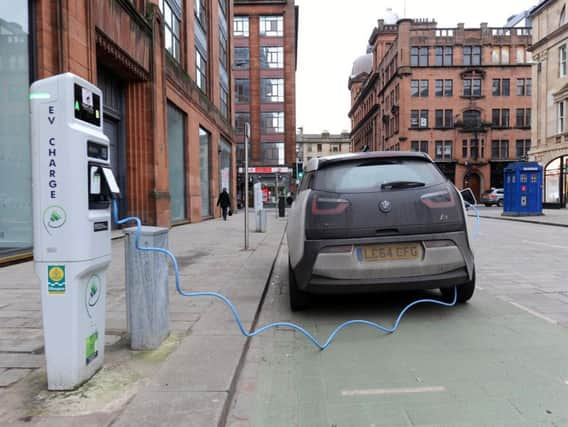EV drivers risking electrocution due to charge point shortage, charity warns


According to a new survey of eco-friendly motorists, three out of four have admitted to cobbling together cabling in order to power up their car at home.
Many have used equipment not suitable for the outdoors, left cars attached to the mains in the rain and “daisy-chained” an assortment of leads to get the required length.
Advertisement
Hide AdAdvertisement
Hide AdConsumer protection charity Electrical Safety First has warned that such risky practises could cause electric shocks and start fires.
The organisation is calling for the Scottish Government to improve the infrastructure of public charging points as latest findings show the growth rate of licensed plug-in vehicles is drastically out-pacing the number of charging points available to drivers of electric vehicles (EVs).
Figures show the number of charging locations in Scotland increased from 608 in 2015 to 995 in 2018 - a rise of 64 per cent.
However, EV registrations have gone up by 272 per cent over the same period - from 2,915 to 10,858.
The charity’s consumer research showed that nearly three in five Scottish EV owners have been forced to use extension leads from a domestic mains socket to charge their vehicle at their destination when taking long journeys away from home or work – two in five have had to do it more than once.
Wayne Mackay, deputy public affairs manager for Scotland at Electrical Safety First, said: “Our research shows a direct link between a lack of electric vehicle infrastructure and vehicle owners charging dangerously, and with so few public charging locations in Scotland this is a real concern.
“Electrical Safety First is urging the Scottish Government and local authorities to ensure that the infrastructure is in place to support the rapid increase in numbers of electric vehicles on our roads.
“We warn EV users against giving in to temptation to use domestic extension leads to charge their vehicles outside, and never to ‘daisy-chain’ them together.”
Advertisement
Hide AdAdvertisement
Hide AdEdinburgh businessman Neil Cuthbert, who drives a Nissan Leaf, has been fully electric since 2016.
He has a dedicated charging point fitted in his garage, but has on occasion had to resort to makeshift charging due to poor provision in the capital.
He believes city councils needs to urgently commit to improving facilities to keep up with rising demand and Scottish Government plans to move away from fossil fuel engines by 2032.
“When I got my electric car I got a charge point put in my garage because you really need a dedicated socket to plug it into,” he said.
“But I have had occasion where I’ve just had to plug it in with an ordinary extension cable and it does get hot. There’s no doubt in my mind that if you’re going to be using these things regularly you need safe dedicated charge points. Edinburgh is a city of tenements - most people don’t have garages, so if people are going to be using electric cars in the future they need infrastructure on the street to charge it.
“In Edinburgh they have got strategies but they’re not actually doing very much. From some of the comments I hear, people are saying they would like to buy an electric car but would need somewhere to charge it.
“There are various things you can do in the streets, like some places are converting lamp posts into charging places, but Edinburgh is not doing any of that.
“It doesn’t look like they’re going to do anything quickly, and in the meantime air quality is suffering.”